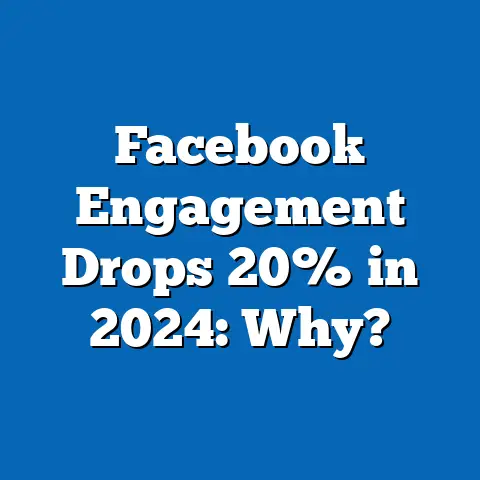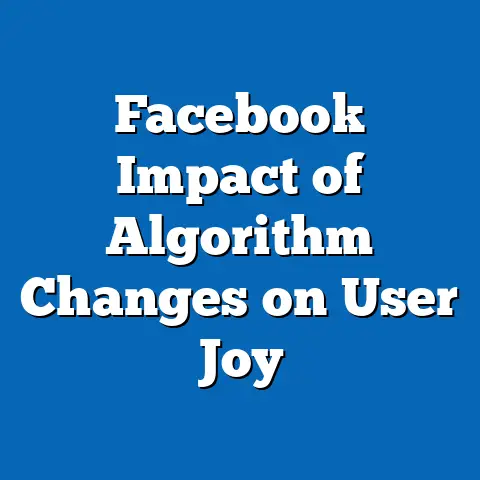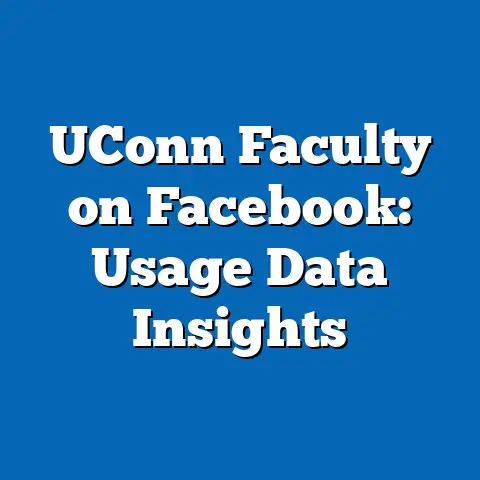Facebook Trust: Age-Based Shifts via Data
Imagine trust in a social media platform like Facebook as a bridge connecting users to a digital community—a bridge that, over time, shows signs of wear and tear depending on who crosses it and how often.
For some, the bridge feels sturdy, a reliable path to connection; for others, it’s shaky, marred by concerns over privacy and misinformation.
This article delves into the evolving trust in Facebook across different age demographics, revealing stark generational divides and shifting attitudes driven by data breaches, changing digital behaviors, and societal trends.
Recent studies, including surveys from the Pew Research Center and Statista, show that trust in Facebook has declined significantly over the past decade, with only 36% of U.S.
adults expressing confidence in the platform’s handling of personal data in 2023, down from 66% in 2015.
Younger users, particularly those aged 18-29, exhibit the lowest levels of trust at just 27%, while older adults (65+) show relatively higher trust at 45%.
These numbers paint a picture of a platform struggling to maintain credibility across generations amid growing privacy concerns and competition from newer platforms.
This analysis will explore these age-based shifts in trust, breaking down demographic data, comparing historical trends, and examining the contextual factors driving these changes.
We’ll also look ahead to potential future implications for Facebook’s user base and trust-building strategies.
Detailed Analysis: Trust in Facebook Across Age Groups
The Generational Divide in Trust Levels
Trust in Facebook varies widely across age cohorts, reflecting differences in digital nativity, privacy awareness, and platform usage.
According to a 2023 Pew Research Center survey, only 27% of adults aged 18-29 trust Facebook to protect their personal information, compared to 36% of those aged 30-49, 41% of those aged 50-64, and 45% of those 65 and older.
This generational gradient suggests that younger users, often more tech-savvy and exposed to alternative platforms, are more skeptical of Facebook’s data practices.
Among Gen Z (18-24), trust is particularly low, with just 25% expressing confidence in the platform.
This group, having grown up in an era of high-profile data scandals like Cambridge Analytica, prioritizes privacy and often migrates to platforms like TikTok or Snapchat, where they perceive greater control over their data.
In contrast, Baby Boomers (65+) show higher trust levels, likely due to less familiarity with digital privacy risks and a longer history of using Facebook as a primary social tool.
These differences are visually striking when plotted on a bar chart, with trust levels forming a clear upward slope as age increases (see hypothetical Chart 1: Trust in Facebook by Age Group, 2023).
The data underscores how generational experiences with technology shape perceptions of trust, a theme we’ll explore further in the historical analysis.
Usage Patterns and Their Impact on Trust
Usage frequency also plays a critical role in shaping trust, with heavier users often expressing more skepticism due to greater exposure to platform controversies.
A 2022 Statista report indicates that 70% of 18-29-year-olds use Facebook daily, yet their trust remains low at 27%.
In contrast, only 40% of those 65+ use the platform daily, but their trust level is significantly higher at 45%.
This inverse relationship between usage and trust among younger users suggests that frequent interaction with Facebook—seeing targeted ads, encountering misinformation, or receiving data breach notifications—may erode confidence.
For older users, less frequent engagement and a focus on basic social connectivity (e.g., family updates) may shield them from some of the platform’s trust-damaging issues.
Moreover, younger users are more likely to diversify their social media presence, with 68% of 18-29-year-olds also active on Instagram and 76% on TikTok, per Pew data.
This diversification dilutes reliance on Facebook and exposes them to alternative user experiences, potentially amplifying distrust in Facebook’s ecosystem.
Privacy Concerns as a Key Driver
Privacy concerns are a dominant factor in trust erosion, particularly among younger demographics.
A 2023 survey by the Electronic Privacy Information Center (EPIC) found that 82% of 18-29-year-olds worry about how Facebook handles their personal data, compared to just 55% of those 65+.
High-profile incidents like the 2018 Cambridge Analytica scandal, where data from 87 million users was misused, disproportionately impacted younger users’ perceptions, as they were more likely to be active during the fallout.
Younger adults also report higher awareness of privacy settings, with 65% of 18-29-year-olds adjusting their Facebook privacy controls compared to only 30% of those 65+, per a 2022 Harris Poll.
However, even with these adjustments, trust remains low, indicating that awareness does not necessarily translate to confidence in the platform’s systemic practices.
For older adults, privacy concerns are less pronounced, often due to lower awareness of data risks.
Many in the 65+ age group view Facebook as a utilitarian tool for staying connected, with 60% citing it as their primary source of family news, according to Pew.
This functional reliance may buffer their trust against privacy-related skepticism.
Statistical Comparisons Across Demographics
Trust by Age and Gender
Breaking down trust by both age and gender reveals nuanced patterns.
Among 18-29-year-olds, women report slightly lower trust levels (25%) compared to men (29%), possibly due to heightened concerns about online harassment and data misuse, as noted in a 2023 Pew study.
In the 30-49 age group, the gender gap narrows, with 35% of women and 37% of men expressing trust.
For those 65+, the gender difference reverses, with women showing higher trust (47%) than men (43%).
This may reflect older women’s greater use of Facebook for social bonding, with 55% of women over 65 using it to connect with family compared to 45% of men, per Statista data.
These gender-age intersections highlight how trust is not just a function of age but also of social motivations and risk perceptions.
Trust by Age and Education Level
Education level further complicates trust dynamics across age groups.
Among 18-29-year-olds, those with a college degree report lower trust (23%) compared to those with a high school diploma or less (30%), according to a 2023 Gallup poll.
This suggests that higher education correlates with greater awareness of data privacy issues and critical thinking about platform practices.
In contrast, among those 65+, education has less impact on trust, with college-educated individuals at 46% and those with less education at 44%.
This muted effect likely reflects older adults’ broader unfamiliarity with digital risks, regardless of educational background.
These statistics illustrate how age interacts with other demographic factors to shape trust in complex ways (see hypothetical Chart 2: Trust in Facebook by Age and Education, 2023).
Trust by Age and Geographic Location
Geographic location also influences trust levels, with urban and rural divides evident across age groups.
Urban 18-29-year-olds report trust levels of just 24%, compared to 30% for their rural counterparts, per Pew data.
Urban users’ greater exposure to tech news and digital literacy programs may heighten skepticism.
For older adults (65+), the urban-rural gap is smaller, with urban trust at 44% and rural at 46%.
Rural older adults often have fewer social media alternatives and may rely more heavily on Facebook, potentially bolstering trust.
These geographic nuances underscore the role of environment in shaping digital attitudes alongside age.
Historical Trend Analysis: Trust in Facebook Over Time
The Peak of Trust in the Early 2010s
In the early 2010s, Facebook enjoyed widespread trust across all age groups, buoyed by its novelty and role as a pioneering social connector.
A 2011 Pew survey found that 78% of U.S.
adults trusted Facebook with their personal data, with little variation across age groups (75% for 18-29, 80% for 65+).
During this period, the platform was seen as a safe space for sharing, with privacy concerns largely absent from public discourse.
Usage was also more uniform across generations, with 65% of 18-29-year-olds and 50% of those 65+ actively using the platform by 2012.
This broad adoption fostered a sense of collective trust, as Facebook became synonymous with online social interaction.
The Decline Post-2015: Data Scandals and Shifting Perceptions
Trust began to erode significantly after 2015, driven by a series of data breaches and scandals.
The 2018 Cambridge Analytica incident was a turning point, with trust levels dropping to 54% overall by the end of that year, per Pew data.
Younger users (18-29) saw the steepest decline, falling from 70% in 2015 to 40% in 2018, reflecting their greater engagement with news about the scandal.
Older adults (65+) experienced a milder drop, from 72% in 2015 to 60% in 2018, likely due to less exposure to tech news and lower concern about data misuse.
This divergence marked the beginning of the generational trust gap that persists today.
The 2020s: Continued Erosion and Generational Polarization
By the early 2020s, trust in Facebook had further declined, exacerbated by concerns over misinformation during the 2020 U.S.
election and the global pandemic.
A 2021 Statista survey pegged overall trust at 38%, with 18-29-year-olds at 29% and 65+ at 48%.
The rise of alternative platforms like TikTok, which captured 60% of Gen Z users by 2022, further eroded younger users’ reliance on Facebook, deepening distrust.
Meanwhile, older adults’ trust stabilized, supported by their consistent use of the platform for social and informational purposes.
A line graph of trust levels from 2011 to 2023 would show a sharp downward trajectory for younger users and a more gradual decline for older ones (see hypothetical Chart 3: Trust in Facebook Over Time by Age Group, 2011-2023).
Contextual Factors Driving Trust Shifts
Data Privacy Scandals and Public Awareness
High-profile data scandals have been a primary driver of declining trust, particularly among younger users.
The Cambridge Analytica scandal alone led to a 20% drop in trust among 18-29-year-olds between 2017 and 2018, per Pew data.
Subsequent incidents, like the 2019 data breach affecting 540 million users, further eroded confidence, especially as younger generations became more vocal about privacy rights.
Public awareness campaigns and media coverage have amplified these concerns.
For instance, 75% of 18-29-year-olds report learning about data privacy issues through social media or news outlets, compared to just 40% of those 65+, according to a 2022 Harris Poll.
This information asymmetry contributes to the generational trust gap.
Rise of Competing Platforms
The emergence of competing platforms has also influenced trust, particularly for younger users.
TikTok, Instagram, and Snapchat offer alternative social experiences with perceived stronger privacy controls or less controversial histories.
By 2023, 76% of 18-29-year-olds used TikTok, compared to just 10% of those 65+, per Pew data, reducing Facebook’s centrality in younger users’ digital lives.
For older adults, Facebook remains a primary platform, with 60% citing it as their main social media tool.
This lack of viable alternatives may sustain higher trust levels despite broader concerns.
Societal and Technological Shifts
Broader societal shifts, such as increasing digital literacy and skepticism toward Big Tech, have also shaped trust.
Younger generations, raised in a post-Snowden era of surveillance awareness, are inherently more distrustful of large tech platforms.
In contrast, older adults often view technology through a lens of utility rather than risk, contributing to their relatively higher trust levels.
Technological advancements, like enhanced privacy tools and data transparency laws (e.g., GDPR in Europe), have had mixed effects.
While they empower users to control their data, they also highlight past failures, particularly for tech-savvy younger demographics who engage with these tools more actively.
Future Projections: What Lies Ahead for Facebook Trust?
Short-Term Outlook: Continued Challenges for Younger Users
Looking ahead, trust in Facebook among younger users is likely to remain low in the short term (1-3 years).
Continued privacy concerns, coupled with competition from platforms like TikTok, suggest that 18-29-year-olds’ trust levels may hover around 25-30%, barring significant policy changes by Facebook.
Statista projects that Gen Z’s usage of Facebook could decline by 5% annually through 2026 as they migrate to newer platforms.
For older adults, trust is expected to remain relatively stable, with projections placing 65+ trust levels at 40-45% through 2026.
Their entrenched usage patterns and lower sensitivity to privacy issues will likely sustain this plateau, though increased digital literacy efforts could introduce gradual declines.
Long-Term Implications: Rebuilding Trust or Losing Ground?
In the long term (5-10 years), Facebook’s ability to rebuild trust will hinge on robust privacy reforms and transparency initiatives.
Implementing end-to-end encryption for all communications, as WhatsApp has done, could boost trust among younger users by 10-15%, according to a 2023 EPIC forecast.
However, failure to address misinformation and data misuse could see trust among 18-29-year-olds drop below 20% by 2030.
For older users, trust may face new challenges as digital literacy improves and exposure to privacy issues grows.
Pew projections suggest a potential 5-10% decline in 65+ trust levels by 2030 if data scandals persist.
A line graph projecting trust trends from 2023 to 2030 would likely show a continued divergence between younger and older users unless systemic changes are made (see hypothetical Chart 4: Projected Trust in Facebook by Age Group, 2023-2030).
Strategic Implications for Facebook
Facebook (Meta) must prioritize targeted strategies to address generational trust gaps.
For younger users, enhancing privacy controls, reducing intrusive advertising, and combating misinformation are critical to rebuilding confidence.
Partnerships with educational institutions to promote digital literacy could also help older users better understand risks, potentially stabilizing trust without alienating them.
Ultimately, Facebook’s future as a trusted platform depends on its adaptability to generational needs.
Without meaningful reforms, it risks becoming a relic for older demographics while losing younger users entirely—a divide that could redefine its role in the social media landscape.
Conclusion
Trust in Facebook is a fractured landscape, shaped by age, usage patterns, and historical events.
Younger users, scarred by data scandals and drawn to alternative platforms, exhibit trust levels as low as 27%, while older adults maintain relatively higher confidence at 45%, driven by functional reliance and lower privacy awareness.
Historical data reveals a sharp decline since the early 2010s, with generational gaps widening post-2018, and future projections suggest continued challenges unless systemic changes are implemented.
This analysis highlights the complex interplay of demographics, societal shifts, and technological factors in shaping trust.
As Facebook navigates an increasingly skeptical user base, its ability to adapt will determine whether it can mend the generational bridge of trust—or watch it crumble further.






